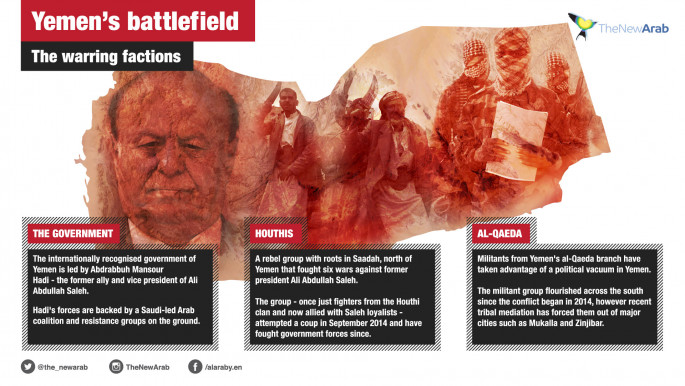Bombs, airstrikes, clashes: The horror that haunts Yemen's civilians
A new report published on Thursday outlined a long list of grave human rights abuses by both the Saudi-led coalition and Houthi rebels, in a conflict that has left more than 6,000 dead.
"Civilians in Yemen have suffered unbearably over the years from the effects of a number of simultaneous and overlapping armed conflicts," UN rights chief Zeid Ra'ad Al Hussein said in a statement.
"And they continue to suffer, absent any form of accountability and justice, while those responsible for the violations and abuses against them enjoy impunity," he said.
"Such a manifestly protracted unjust situation must no longer be tolerated by the international community," he insisted, demanding the creation of "an international, independent investigative body".
Multiple Arab coalition attacks on residential areas, market places, hospitals and schools were noted in the report, pointing out that in several cases investigators were "unable to identify the presence of possible military objectives."
 |
Civilians in Yemen have suffered unbearably over the years from the effects of a number of simultaneous and overlapping armed conflicts |  |
Around half of all civilian deaths have been blamed on Saudi-led coalition airstrikes, while attacks by groups affiliated with the Houthis were blamed for around a quarter of the deaths, Thursday's report said.
The Islamic State group, al-Qaeda and a range of other militant players accounted for the remainder of the death toll.
The findings come as violence continued to escalate across the country this week, with airstrikes pounding the capital as clashes erupted in other major cities.
"The war between Houthis and Saudi allies is devastating the nation and both sides continue to justify their actions," Yemen based journalist, Hakim Almasmari told The New Arab.
"But the killing of civilians can never be justified."
"At least 14 civilians were killed over a 24 hour period due to Saudi airstrikes," he added, "that brings the death toll to 124 killed in the last week."
The report also condemned targeted killings – including of at least six journalists – the use of cluster bombs, landmines, and sniper attacks, and the rampant use of child soldiers by Houthi rebels.
"Houthis have imprisoned thousands of opposition activists and dozens of journalists. Not to mention closing hundreds of media websites and publications."
 |
Houthis have imprisoned thousands of opposition activists and dozens of journalists. Not to mention closing hundreds of media websites and publications |  |
Countless condemnations, little accountability
Despite the apparent violations, condemnations by rights groups and countless fact-finding reports, little has been done for the 22 million Yemenis that have endured more than 17 months of conflict.
The devastating war – described as a global catastrophe by rights groups – has left some 7.6 million people, including three million women and children, suffering from malnutrition, while forcing at least three million to flee their homes.
At least 559 children have been recruited into the conflict – mainly by Houthi rebels – who order young fighters to take up arms and fight on the battlefield. They have also been found manning security checkpoints in and around the capital Sanaa between July 2015 and May 2016.
Since last year, at least 620 children were killed and 758 maimed, prompting the government to set up a national commission of inquiry into the deepening crisis.
But the UN said the inquiry had been unable to conduct an effective investigation, noting "the gravity of allegations" and "the challenges faced by the national commission of inquiry".
 |
Since last year, at least 620 children were killed and 758 maimed, prompting the government to set up a national commission of inquiry into the deepening crisis |  |
The report urged the creation of "an international, independent investigative body to carry out comprehensive investigations."
"The international community... has a legal and moral duty to take urgent steps to alleviate the appalling levels of human despair," the UN rights office said.
Ongoing search for peace
Meanwhile, US Secretary of State John Kerry announced a fresh international peace initiative on Thursday to help resolve raging conflict.
"This war needs to end and it needs to end as quickly as possible," Kerry said after a meeting in Riyadh with King Salman, the UN envoy to Yemen, Ismail Ould Cheikh Ahmed, Britain's Middle East under-secretary Tobias Ellwood and Gulf ministers.
 |
This war needs to end and it needs to end as quickly as possible |  |
The senior diplomat said participants attending the meeting during his two-day official visit to the kingdom had "agreed on a renewed approach to negotiations" between Yemen’s warring factions after three months of peace talks in Kuwait collapsed earlier this month.
Elsewhere in war-torn Yemen, al-Qaeda militants rampage on through much of the southern and eastern parts of the country – they too, seemingly exempt from punishment as the world watches on.
 |
|





 Follow the Middle East's top stories in English at The New Arab on Google News
Follow the Middle East's top stories in English at The New Arab on Google News


